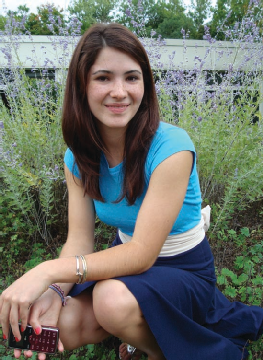I'll be a fifth-generation Cornellian—if I get in
I'll be a fifth-generation Cornellian—if I get in
I stayed toward the back of the tour group, casually snacking on chocolates and watching the guide walk backward across Ho Plaza, pointing out the clock tower and the Cornell Store. When a worried parent asked about the Ithaca winters, I chuckled at the descriptions of blizzards and sub-zero temperatures, since I have lived in Ithaca most of my life. Yet there I was on East Hill, taking a tour despite the fact that I probably know my way around campus as well as the guide.

I wondered if we were going to pass Rice Hall, named after my great-great-grandfather, James E. Rice, Cornell's first professor of poultry science. Many of his six children attended, including my great-grandmother, Ruth Rice McMillan '23. The Cornellian legacy has continued through the generations, and I hope it will include me. But getting in is no easy slide down Libe Slope; it's a long, steep climb up the academic ladder, and many students never reach the top. More than 34,000 people applied for admission to the Class of 2013; only about 6,500 were accepted, with about half choosing to enroll.
High school seniors everywhere are under a lot of pressure this time of year. We have to go on last-minute campus tours, narrow our choices to a dozen colleges, then get our applications in on time. We've been building relationships with our teachers and counselors, bosses and advisers, and now it's time to bake them brownies and ask for letters of recommendation. On top of all this, we still have to keep our grades up. It's as if we're trying to balance between two rickety platforms—one representing college, the other high school. If we lean too far in either direction, we topple.
For many of us college-bound seniors at Ithaca High School, Cornell is at the top of our wish lists. The University seems to accept a fair number of IHS students, which encourages more to apply. It's become an unspoken hope that because we are the "Little Red," Cornell's younger-brother high school with reputable academics, the University is favorably inclined toward us.
I have already decided to apply to Cornell early decision. It seems unthinkable for me to go anywhere else. If I get in, I'd be the fifth generation of my family to attend. And my Big Red connections already go beyond my relatives. I interned at Cornell Alumni Magazine this summer—following in the footsteps of my great-aunt Elsie McMillan '55, who worked as an editor here for a quarter-century. I am also a Cornell employee; for two years I have worked as a camp counselor for Cornell Cooperative Extension. Every morning in the fall and spring my high school crew team watches the sun rise over campus as we row up and down the west shore of the lake, mingling with Big Red boats along the way.
Academically, I've never earned a final grade lower than a B. I've taken challenging courses, earning a 4 out of 5 on the Advanced Placement chemistry exam. After cramming with prep classes, I earned a 1910 out of 2400 on the SAT, and did well enough on my three SAT II subject tests to be ranked in the eighty-second percentile. In terms of extracurricular activities, I've rowed varsity crew for three years, taken singing lessons twice a week, tutored in Spanish, worked at Coop Extension, and volunteered at a local soup kitchen and the SPCA. Yet to Cornell, I'm just an average candidate.
So. . . what if—despite my solid grades, family legacy, and outside interests—I don't get in? It's one thing to choose to study elsewhere, but rejection is a different story. If anyone in my family applied to Cornell and wasn't admitted, they've kept it to themselves. What they do mention is how competitive the college admission process has become; they often say that if they had to apply now, they doubt they would get in. This is supposed to make me feel better, and in a way it does, but it also reminds me how difficult it will be to get into the college of my dreams. I can only hope that I receive an acceptance letter in December— and someday lead my own campus tours, waving to great-great-grandpa on my way past Rice Hall.
— Arianna White


